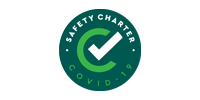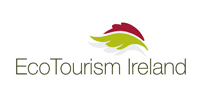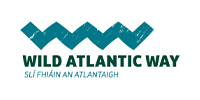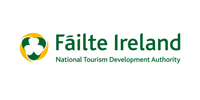The Dolphin Hotel is a small family owned hotel, committed to EcoTourism, set amongst the unique landscape and culture of Inishbofin island, on Ireland’s Wild Atlantic Way. The Coyne family have been welcoming tourists to Inishbofin for over 25 years. We love our island and do our utmost to maintain its culture and traditions. We love to share our knowledge about the island.
Inishbofin is a special place, designated a Special Area of Conservation and a Special Protection Area. It is one of the few places in Ireland where the distinctive call of the endangered corncrake can still be heard. The island has a diverse mixture of habitats from pristine beaches, sand dunes and rugged cliffs to bogs and hay meadows.
We are lucky enough to be able to share this special place with visitors and have an opportunity to highlight important environmental issues that directly affect our community such as waste management, marine pollution and farming and conservation.
We believe that ecotourism is a way for Inishbofin to develop tourism in a sustainable way that will leave our island in its pristine state for future generations to enjoy.
We try to consider the environment in all that we do. We are working towards minimal impact in the following ways:
1) Environmentally Sustainable Practices
Energy Consumption
- We have designed the hotel to maximise passive solar heating so heating costs are kept to a minimum. For the same reason, there is no need for daytime lighting in most of the building.
- 10 Solar panels provide all of the hotel hot water needs in summer for bedrooms and kitchen.
- Our self-catering cottage has 3 solar panels and has a B1 energy rating.
- Both the hotel and self- catering cottage are insulated to a very high standard throughout.
- We use LED lighting throughout the hotel and cottage.
- We try to reduce the amount of washing by reducing number of pillows and offering customers the chance to reuse their towels. We don’t use tablecloths in the restaurant.
- We purchase washing and drying machines which are A energy rated.
- We used recycled local stone in the construction of the front of the hotel and cottage.
Waste
- We are working to reduce the amount of waste we generate.
- We reduce, reuse, recycle as much as possible
- We reduce waste by buying in bulk.
- We only serve ketchup, mayonnaise, sauces and sugar in reusable containers and have phased out individual jams and butter containers from the restaurant.
- We recycle all of our plastic, paper, cans, tins and glass and batteries.
- We return all our cardboard packaging to our suppliers.
- We only print if necessary, on recycled paper, two-sided printing on a new energy saving printer.
- We provide information in the bedrooms about recycling, issues of waste management on an island and marine pollution.
- We sell refillable water bottles from the restaurant and encourage customers to use these rather than disposable plastic bottles.(which we do not sell.) The proceeds from these go to Inishbofin Nature Trust.
- We sell reusable travel mugs from the restaurant and encourage customers to use these rather than disposable cups. The proceeds from these go to Inishbofin Nature Trust.
- We compost all our food waste.
The hotel has a sewage treatment plant Bord na Mona Waste Water Treatment Plant Platinum Acorn inspected twice yearly by a qualified inspector.
Water
Our water comes from the mains supply derived from the island reservoir. With extra visitors in summer this is under extreme demand so we are working to reduce our water consumption in the following ways:
- We only have 3 baths in the hotel, the rest of the rooms have showers.
- We make customers aware of water conservation by information in their rooms.
- We try to reduce the amount of washing by reducing the number of pillows and offering customers the chance to reuse their towels.
- We don’t use tablecloths.
Green Purchasing Policy
- We buy in bulk to save packaging.
- We use local fish and vegetables where possible.
- We purchase Fairtrade teas, coffee and sugar.
- We don’t use disposable cups/plates/cutlery
- We have switched to purchasing only recycled paper and envelopes. We get our ink cartridges refilled in Galway. All marketing is done on-line and we have a booking engine on our website.
- Low energy bulbs are used throughout the hotel.
- We use environmentally friendly Lilly’s Eco Clean cleaning products in all areas of the hotel. We chose this company because it is Irish so we are supporting Irish jobs and reducing transport impacts. we also use and Auro cleaning products
- We consider the environment when making purchasing decisions and we try to use suppliers who try to minimise their environmental impact.
Impacts on biodiversity
We don’t use pesticides or herbicides on our garden. We use organic peat free compost in our vegetable garden and we let it go to seed in autumn to provide feed for wild birds. We have bird feeders and bug hotels. Our tours follow Leave No Trace principles and Minimal Impact Birdwatching and Hillwalking codes.
We try to minimise the impact of the hotel on the local environment, and have planted 100 trees behind the hotel on a field which had been waste ground following the building of the hotel. This area has been regenerated into a wildlife area with the creation of a pond and use of planned mowing to encourage growth of red clover, a valuable food source for bees.
2) Natural area focus
All our ecotourism products are based almost completely outdoors, immersed in the beautiful nature and scenery of Inishbofin, an SAC and an SPA because of its importance as a breeding site for the endangered corncrake. Birdwatching courses involve full days of walking through unspoilt areas, including cliffs, beaches, hills and bogs.
- Inishbofin is a Special Area of Conservation(SAC 00278) selected for the following habitats/species listed under Annex 1/11 of the EU Habitats directive:
coastal lagoons, oligotrophic waters containing very few minerals, wet heath and dry heath.
Grey Seals breed on neighbouring Inishark and other smaller islands, and on the Stags of Bofin.
- Approximately one fifth of Inishbofin is classed as a Special Protection Area (004231)and is of high ornithological significance due to its breeding population of corncrakes. The Corncrake is on the IUCN red list of threatened species, due to population and range declines of more than 50% in the last 25 years across significant parts of its range. It is also listed in Annex 1 of EU Birds Directive.
- Several other species from the Red list breed here e.g. lapwing, herring gull, meadow pipit. Amber listed are skylark and chough.
- The West Connaught Coastal SAC(9002998) extends from to the Erris Head down to Ballyconneely, fringing Inishbofin and Inishturk. It is an exceptional area of key conservation importance for Bottle-nosed Dolphins in Ireland.
- Inishbofin has a small area of Machair, a coastal grassland unique to northern and western coastal areas of Ireland and Scotland, which supports a rich diversity of plant, insect and bird life. This was restored under the Duach Beach Restoration Project several years ago.
We also have a beautiful coastline which is a mix of rocky and sandy shores. Marine pollution and sustainable fishing practices are subjects which directly affect our community.
3) Interpretation and education
Our ecotourism courses offer personal interpretation with experienced guides.
Anthony McGeehan, our birdwatching and photography guide, has been watching and photographing birds for many years. He has worked for RSPB in Northern Ireland, with many years of experience in conservation and education,and now works with Birdwatch Ireland on bird surveys and monitoring schemes. He is a superb bird photographer and a published author and a recognized authority on birds. He records important bird data on Inishbofin, and is constantly striving to create and improve habitats to enrich biodiversity on the island. His number one priority is the welfare and conservation of birds.
In running our ecotourism tours, we are careful not to disturb wildlife or the local environment.
We adhere to Leave No Trace principles in all our activities and we expect our guests to respect nature and local inhabitants. We follow Minimal Impact Birdwatching and Hillwalking Codes. Small group sizes of under 15 make for a friendly, intimate tour, better access to the guide, and minimal disturbance to wildlife.
We inform people about sustainability issues and encourage them to adopt eco-friendly practices into their daily lives. We provide in room information about the island and various environmental issues including:
- corncrakes and other species from the IUCN Red List
- Leave no Trace Principles
- Problems of waste management on an island and promotion of recycling
- 2 Minute Beach Clean, Marine Pollution and Micro Beads
- Sustainable fishing
- How they can measure their Carbon footprint and offset it
- How they can support conservation organisations
- Other Ecotourism Ireland Operators
We have a library of books about wildlife and field identification keys for guest use.
We provide copies of Wings (the magazine of Birdwatch Ireland) and Irish Wildlife trust in public areas for our guests. Anthony’s McGeehan’s birdwatching books are available to purchase.
We bring children from the Inishbofin After School Club on field trips to our birdwatching station.
Through our website we provide information on public transport options to Inishbofin.
4) Contributing to conservation
Inishbofin and neighbouring islands are important breeding sites for many species of birds which feature on Birds of Conservation Concern in Ireland ( BoCCI) list for 2014-2019,updated by Birdwatch Ireland and RSPB NI.
On the Red list, of highest conservation concern, are corncrake, meadow pipit, lapwing.
On the Amber list, of medium concern, are Chough, Great Skua, House Martin, House Sparrow, Robin, Puffin, Razorbill, Sand Martin, Shag, Skylark, Starling, Stonechat, Storm Petrel, Swallow, Wheatear. Many migrating birds stop off here to feed.
We have set aside an area of ground behind the hotel which was previously barren after building work finished. We have planted approximately 100 native Irish trees which provide useful habitat for birds. This is very important as there are very few trees on the island. We also have a bird feeding station in this field. We have cleared areas of rushes and planted oats to provide winter feed for autumn migrants and overwintering birds. Several rare birds have been spotted here, including rare Arctic Warbler and Siberian Chiff Chaff.
We have also created a small wetland area here. We have seen water rail and grey heron here and the pond is full of tadpoles. Otters have been seen close to this area and we have caught photos of them visiting our pond on our trail camera. Every year we are making small improvements to increase the biodiversity of this area. We are currently working on making a suitable habitat for corncrakes by encouraging nettle growth. We mow an area of meadow to encourage the growth of red clover for bees.
We have set up a voluntary visitor payback scheme to channel funds, through Inishbofin Nature Trust, into local conservation projects such as tree planting, creating early cover for corncrakes, sowing winter oats for birds and eradicating invasive plants.
Through our Ecotourism Ireland training network we are participating in creating a Biodiversity Action Plan for Inishbofin to protect and enhance the unique biodiversity of the island.
We participate in the Inishbofin Clean Coast clean up annually. We also promote the 2 Minute Beach Clean to our guests.
We subscribe annually to the Irish Wildlife Trust and Birdwatch Ireland.
5) Benefitting local communities
In 2019 we employed 6 local people in the hotel.
Our customers use the ferry service, owned and operated by an island family. We encourage them to visit the local craft shop and museum, and we sell some local craft products from the hotel.
All our photographs throughout the hotel are by local historian and photographer Marie Coyne.
We have been involved in Bia BoFinne, the Inishbofin food festival since it was started in 2013, hosting cooking demonstrations and providing our own home grown lamb for use in the festival.
We use locally caught pollock on our menus and local vegetables from Lacey’s Farm whenever possible.
We are actively involved in the Inishbofin Tourism Association and support initiatives that benefit the island such as the Wild Atlantic Way and local festivals such as Bia Bo Finne and Inishbofin Trad weekend.
Over the past 5 years we have raised over €200,000 for Down Syndrome Galway, a charity which provides speech and language services to 100 families in Galway and Connemara. We organise the annual Inishbofin Half Marathon & 10K run, Bike 2 Bofin charity cycle and other fundraising events. These also bring business to other accommodation providers and the ferry operator.
6) Visitor satisfaction
The Coyne family has always been known for its warm welcome and customer service has always been at the heart of our tourism products. We are committed to ensuring all our guests have an inspiring holiday and get a sense of the unique culture and natural history of Inishbofin. We welcome guest feedback, both positive and negative, as it helps us to improve our product. All our guests are given the opportunity to give feedback to their guides, as well as filling in a questionnaire on departure. We are also registered on Facebook and Tripadvisor, where people can post feedback. We have recently adapted our questionnaire to allow guests to comment on our environmental practices.
7) Responsible marketing
All our marketing materials are accurate and informative, giving customers a realistic idea of what the ecotourism product involves, where it takes place, group size and how they should behave. We provide accurate information about the locality, and truthful photography.
In all marketing we follow and promote the principles of ecotourism and Leave No Trace. All our marketing is done electronically, through our website, and social media. We don’t print fliers. All correspondence to customers is by email. We send and receive invoices by email. We advertise our birdwatching weekends in Wings magazine, thus supporting Birdwatch Ireland. If we do print we use both sides, use recycled paper and envelopes and we refill our ink cartridges.
8) Cultural respect and awareness
We love our island and do our utmost to maintain its culture and traditions. We love to share our knowledge about the island. When Pat built the hotel he had an eye on the future but didn’t forget his island heritage. He has continued the farming tradition of his father, farming cattle and sheep, while developing a vibrant tourism business. The hotel was named after a traditional fishing ‘nobbie’ from the 1920s called The Dolphin, owned by his maternal grandfather, Pat Davis from Westquarter. At that time about 10 of these boats fished out of Inishbofin. The original sail, lug lantern and compass can be seen in the Inishbofin Heritage Museum, run by Pat’s sister Marie. Over the years she has gathered a huge collection of old photographs, farming and fishing tools and has several local interest books to purchase, as well as having an interest in geneaology. We encourage all visitors to pay a visit to get a true feeling of the history of our unique island. We host exhibitions of Marie’s island photography throughout the season, as well as Anthony’s bird photography.
We have a library of books about Inishbofin, its culture, traditions, archaeology and people.
We use social media to advertise local cultural events. We support local festivals such as Inishbofin Community Arts Festival, Inish Festival, Bia BoFinne food festival and Inishbofin Set Dancing and Trad weekend.
